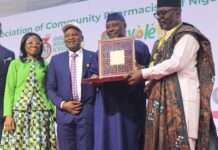(By Adebayo Folorunsho-Francis)
In this interview with Adebayo Folorunsho-Francis, Pharm. Obiora Ezekwesili, technical and manufacturing director of AfrabChem Nigeria poured out his heart on the scourge of malaria, perennial neglect suffered by indigenous pharmaceutical producers and why the government needs to invest heavily in the local manufacturing industry in Nigeria.
Read the excerpts below:
In view of the World Malaria Day, can you boldly say Nigeria is winning in its fight against the scourge?
Well, I think the campaign against malaria is partially successful in Nigeria. So much has been done in this area but, unfortunately, organisations keep changing. Most of the anti-malarial drugs you see around tend to lose potency seven years later and new ones are brought in to replace them. It is quite hard for you to see a drug that cuts across generations or that stays long enough.
It appears many still prefer Chloroquine to Artemisinin-Based Combination Therapies (ACTs) despite the embargo placed on it. How do you react to this?
Embargo or not, I don’t see anything wrong with that. Besides, top pharmaceutical companies like AfrabChemstill produce Chloroquine drugs, to provide relief for babies and the demand is still growing. Those saying that it is no longer relevant don’t fully understand what they are saying. What works for somebody might not work for another. For instance, in most hospitals you visit today, Chloroquine is still effectively used, even though the doctors may not tell you this.
How wouldyoureact to complaints about the high cost of ACT drugs?
As a Nigerian, I am not in support of federal government-subsidized ACT. Why go all the way to India to make such arrangement? Why not invest here locally? It is a good thing that the price is shooting up now. This should make the government to start looking inward and conclude logistics to invest wisely in our manufacturing sector.
Are you saying Nigeria has the capacity to produce these drugs here cheaply?
Yes! In fact, I am insisting that the solution lies in the local industry. The government can even set up these facilities on their own, without contribution from private bodies. After all, if Ghana can boast of having one that was built by her government, why not Nigeria? Besides, it is bound to also throw up employment opportunity for the masses.
What is your view about pharmacists’ struggle against drug counterfeiting in the country?
To be frank, counterfeiting is a global problem, and not an issue for Nigerian local drug producers alone. That said, I bought this idea of Mobile Authentication Services (MAS). NAFDAC has instructed that every anti-malarial product should now carry a scratch panel for patients, and for those buying them to clarify the authenticity. From what I have seen so far, I think it is effective. You can fake things but you cannot fake that! Counterfeiting is a problem of discipline. There should be a proper way to do what you have to do.Follow NAFDAC guidelines and directives, use right distribution channels and rest assured that your products are safe.
Tell us a bit about the state of pharmaceutical manufacturing companies in Nigeria
Well, all I can say is that local manufacturers in Nigeria are still doing well. For instance, I visited a company in Denmark where about 10 Nigerian local pharmaceutical firms were nominated, as part of WHO pre-qualification plan. I was happy that about four of those companies were approved. Unfortunately, the support from government is just not there, unlike India, Pakistan and other countries, where their governments placed restriction on the number of drugs to be imported into those countries. As I said, our local industry is still growing but could have gone faster than the present state. Government should learn to encourage indigenous manufacturers in the areas of power, infrastructure, regulation, investment and technology transfer.
What is the role of PMG-MAN on this issue?
The Pharmaceutical Manufacturers Group of the Manufacturers Association of Nigeria (PMG-MAN) is, in fact, trying and constantly liaising with the government. I must commend the current executives of the association. They have been up-and-doing. But as I mentioned, the government is still expected to do more. Go and check the records, you will see that the biggest companies in the world are pharmaceutical companies. All I am saying is that local manufacturers need encouragement. Our government should back local pharma producers, financially and morally.













